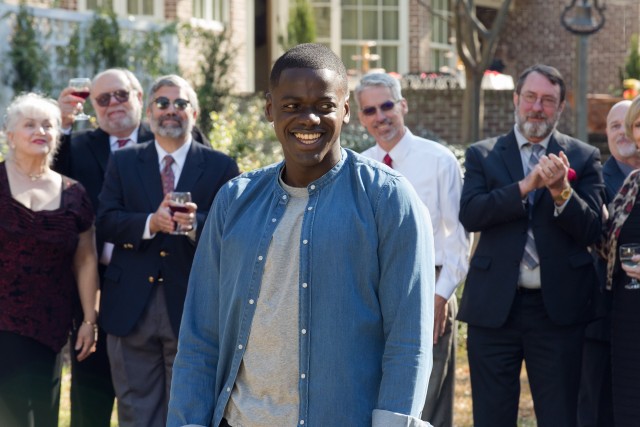Get Out Movie Review
 |
Get Out
Theatrical Release: February 24, 2017 / Running Time: 103 Minutes / Rating: R Writer/Director: Jordan Peele Cast: Daniel Kaluuya (Chris Washington), Allison Williams (Rose Armitage), Catherine Keener (Missy Armitage), Bradley Whitford (Dean Armitage), Caleb Landry Jones (Jeremy Armitage), Marcus Henderson (Walter), Betty Gabriel (Georgina), Lakeith Stanfield (Andrew Logan King), Stephen Root (Jim Hudson), Lil Rel Howery (Rod Williams) |
Ghosts. Demons. Psychopaths. These are typical horror movie villains and even if you believe all of those are real things, your life experiences with them are hopefully and likely limited. Though it is written, directed, and produced by Jordan Peele, half of the comedy duo Key & Peele, Get Out is no more comical than your average serious horror movie. After a prologue finds a black man lost walking around suburbia getting abducted and seemingly murdered, we come to our central story. This weekend, artsy urban photographer Chris Washington (Daniel Kaluuya) is about to meet the family of Rose Armitage (Allison Williams), his girlfriend of five months. The twentysomething couple drives to the country estate that Rose's neurosurgeon father Dean (Bradley Whitford) and psychiatrist mother Missy (Catherine Keener) call home.
Chris has trepidations. He's black. Rose is white. And though times have changed since Loving, interracial relationships still make some people uncomfortable, especially older people who grew up when prejudices were more frequently voiced. Chris gets his first taste of rural racism when for no reason at all a police officer asks to see his ID after Rose hits a deer with her car. He brushes the incident off. He's also okay with Rose's liberal family not being as cool and graceful about his race as they think they are. He even tolerates the drunken rantings of Rose's MMA-obsessed brother (an unhinged Caleb Landry Jones).
But something is not right here. The Armitages employ a couple of black workers who resemble audio animatronics with their docility. And all the white townsfolk showing up for the family's annual get-together are mildly to moderately offensive with their prejudiced banter. After a session of hypnosis with Missy stamps out his taste for smoking, Chris begins to think his life is in danger and we have good reason to believe he's right.
Horror films usually test our willingness to suspend disbelief with the preposterous scenarios they pose. But much of what transcends in Get Out is believable and that makes it more unsettling and disturbing. Yes, this is a horror movie, but it is one with social relevance as it presents the ways in which racism manifests, often harmlessly, in well-intentioned conversations. There are some twists you might see coming and a number of others you might not.
Peele is not sending up horror the way he and Key sent up crime movies in the endearing Keanu. He's just making a better version of the kinds of horror movies that are released in two or three thousand theaters every few weeks. This is less a horror movie for horror mavens who relish gruesome, graphic kills and more of a horror movie for people who like smart movies that make you think. Get Out doesn't believe itself to be some highbrow masterpiece, like a new generation's Guess Who's Coming to Dinner. It just puts fun and relevance into a genre that is too often lacking both. The better than average cast does a good job of selling the material, but it is the material itself that compels while not being derivative or hackneyed.
Premiering at the Sundance Film Festival to universally favorable reviews, Get Out might well do better with critics than moviegoers, based on the many empty seats at my screening and the upsettingly mediocre 6.1 average user rating it held pre-release on IMDb, a site whose votership has exhibited some regrettable tendencies to vote down certain racially representative works.
|
Related Reviews:
DVDizzy.com | DVD and Blu-ray Reviews | New and Upcoming DVD & Blu-ray Schedule | Upcoming Cover Art | Search This Site
DVDizzy.com Top Stories:
Now in Theaters: Rings • Logan • Fist Fight • The Great Wall
Written by Jordan Peele: Key and Peele: Season 1 • Keanu
Well-Reviewed Horror Movies: The Witch • It Follows • The Conjuring
Text copyright 2017 DVDizzy.com. Images copyright 2017 Universal Pictures, Blumhouse, QC Entertainment Productions, and Monkeypaw Productions.
Unauthorized reproduction prohibited.

